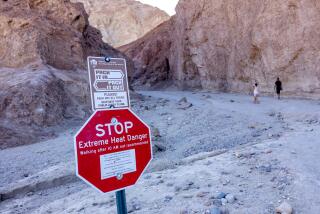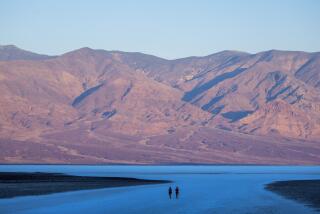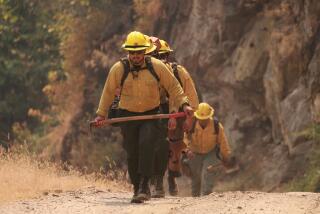Heat Pushes Marine to Seek Discharge
- Share via
An angry Camp Pendleton Marine, home from Saudi Arabia, is seeking a medical discharge because of his intolerance to the heat and complains that his unit commanders were callous to him when he collapsed, despite Navy doctors’ insistence that he be evacuated from his desert outpost.
Pfc. Roger Kendall said he was one of many Marines in Saudi Arabia who collapsed in the heat--and who got no sympathy from commanding officers.
“The doctors were all complaining for me. They said I could die, but my captain said that (release from duty) would ruin morale because, if I got out, others would want to, too, and that the only way I’d get out was in a body bag.
“Then they told me that, if I refused to run, I’d be put in the brig and would lose my pay. So all I could do was run, to push myself, until I’d black out again.”
Kendall, who turns 20 on Sunday, said he fainted from heat a dozen or more times during his six weeks in Saudi Arabia. Medical documents in his personnel file show that his body-core temperature reached 108 degrees at one time, and was more than 104 degrees several other times. Body-core temperatures of 105 degrees or higher can bring on heat stroke, medical authorities say.
Kendall, whose request for a medical discharge has yet to go before military authorities at Camp Pendleton, said he is speaking out because “people need to know how Marines are being treated” by their unit commanders in Saudi Arabia.
“I’ve got my case (for medical discharge) made, for sure,” Kendall said at his Fallbrook home. But, he said, “People have been going down worse than me over there. That’s why I’m saying this. This is the truth of how Marines are being treated there.”
Kendall said that on one occasion when he fell from the heat he was kicked in the ribs and the head by superiors who tried to get him to stand up. Other times, he said, he was accused of “faking it” even though, according to medical reports, he was brought in to battalion aid stations unconscious.
“You can’t fake a 108-degree temperature,” he said. “Maybe you could bring it on by not drinking water, but, after I was brought in the first time, they monitored how much water I was drinking. I was going through five to eight (one-quart) canteens a day, and I was still collapsing when I went back out.”
Kendall was finally ordered out of Saudi Arabia on Oct. 3 after requesting mast (meetings with higher-ranking officers) and finally getting access, he said, to a sympathetic superior.
His final medical report, signed by a Navy doctor identified by his signature as J. LaRorque, reads: “Medical evacuation to CONUS (Continental United States) is recommended because pt (patient) experienced episode of heat stroke. He is now excessively vulnerable to heat stress, and thus no longer fit for duty.”
That same doctor wrote in a different report: “Core temperature of 108 + unconsciousness = heat stroke. Pt. is permanently vulnerable to heat stress, thus unfit for duty.”
That was the last in a series of medical reports documenting his condition--reports, he said, that were ignored by his unit, the assault weapons platoon of Lima Company, 3rd Battalion, 9th Marines Regiment of the 1st Marine Division out of Camp Pendleton.
Kendall says that, given the lack of cooperation from his unit commanders in Saudi Arabia, he expects to face opposition here to a medical discharge and is enlisting the help of an attorney in San Diego to press his case for a discharge with medical disability payments.
Staff Sgt. Vicki Turney, a Marine Corps spokeswoman at Camp Pendleton, said Kendall’s request would go before a medical review board, “which will make the determination whether he is still fit for duty. There’s been no determination as of this point as to what type discharge, if any, that Kendall would receive.
“He’s still a Marine, and his discharge, if any, is pending,” she said.
Meanwhile, Kendall is performing limited duties at Camp Pendleton, including daily flag raising and lowering and light office chores.
Kendall said he first fell from heat while training at the Twentynine Palms combat training base in San Bernardino County. According to medical documents, Kendall experienced “weakness, blurry vision, headache, nausea, vomiting, profuse sweating . . . and upper-extremity numbness.”
A week later, he was deployed to Saudi Arabia.
The first recommendation that Kendall be flown back to the United States came Aug. 23, according to medical records. That day, records show, he collapsed and “appeared unconscious” while on a series of exercises, and was taken to a battalion aid station.
A Navy doctor who examined Kendall that day noted that Kendall “had a more severe heat injury 48 hours ago,” when his core body temperature reached 108 degrees.
“My medical recommendation is that this patient be Med-evac’d back to U.S. ASAP, and that he have no PT (physical training), no exercise, and no outside exposure (for) seven days. These recommendations have been made in person by myself and Dr. Roegner to the battalion XO, Major Vrabel,” wrote a Navy doctor identified only as Lt. Cmdr. Naylor.
Later that same day, Roegner wrote:
Patient “was (treated) for heat exhaustion as above, 48 hours ago. Recommendation at that time was LD x 72 (light duty for 72 hours). This was conveyed to his platoon commander, Lt. Eichorn, at that time. Per patient tonight, he was made to run (within) 24 hours release from medical care for the first heat exhaustion, in 100 (degree) temperature. Then today, (he) was made to run twice (once in a.m. and once at night) where he became heat exhausted again. I concur with the above notes” by Naylor.
On Sept. 26, another medical report by Roegner said Kendall had been brought in at the request of his battalion commanding officer “for evaluation of further service in the desert.”
The evaluation was necessary “because of possible malingering charges being brought up by the company,” the report noted. The doctor, Roegner, said that, although Kendall was still suffering from diarrhea, he was otherwise “fully acclimatized and fit for full duty.”
Kendall argues that Roegner’s prognosis--that he was fit for duty--was the result of pressures from his unit that he be returned to his duty post. After that, Kendall said, he formally sought Mast, to speak to higher-ups.
“If I didn’t ask for Mast, I wouldn’t have been able to see any more doctors,” he said. “They weren’t going to give me any more medical treatment.”
On Oct. 1, he was seen by Dr. Frederick Morgan, a Navy lieutenant commander serving as a regimental surgeon, who summarized Kendall’s condition this way: “Since arriving in Saudi Arabia, he (Kendall) states he was treated by a corpsman, sometimes he received no treatment, and was brought to BAS (Battalion Aid Station) on three occasions which are documented.
“The physician’s note 8/23 indicates heat stroke with a core temperature of 108 degrees rectal, a life threatening condition, on 8/21/90.
“This was followed by a case of heat exhaustion with core temperature of 104 degrees rectal 8/23/90. Dr. Naylor found him unfit for desert field service and recommended Medevac to U.S.
“Instead, the medical record clearly reveals that (patient) was made to perform rigorous physical activity on several occasions within 48 hours after heat stroke, in temperatures exceeding 100 degrees F, in spite of medical contraindications communicated to 3/9 Battalion Executive Officer and platoon commander.
“This contradicted physical activity was directly responsible for his treatment failure on 23 Aug. (heat exhaustion) and again on 24 Aug (heat cramps).
“There is also an undocumented case on 25 Aug when he went down during P.T. (physical training) and was kicked and slapped in the presence of the platoon sgt, co. 1st sgt and platoon commander. He was brought to the BAS incoherent and likely unconscious since he received a sternal rub,” in which the chest is rubbed firmly with knuckles to elicit a response from the victim.
“He clearly remembers the acute sternal pain for several days. He also admits to bruises on his body,” Morgan wrote.
The last documented heat injury was Sept. 11, he said.
The doctor concluded: “His lowered endurance is highly susceptible to repeat injury which may be complicated by death.”
The next day, doctors ordered him returned to the United States.
Marine Corps officials at Camp Pendleton said they were unable to address charges by Kendall as to the treatment he sustained from his unit in Saudi Arabia.
And the public affairs office for the joint-forces Central Command in Saudi Arabia said they did not immediately know how many troops have been returned to the United States because of heat problems there.
Kendall, meanwhile, is unsure of his future. “I can’t do labor because I can’t get overheated. I can’t even have sex without overheating and getting dizzy.
“I’ve got a wife and a 7-week-old son to support, and I don’t have any other skills. The only skill I have is to blow things up,” he said.
More to Read
Sign up for Essential California
The most important California stories and recommendations in your inbox every morning.
You may occasionally receive promotional content from the Los Angeles Times.













